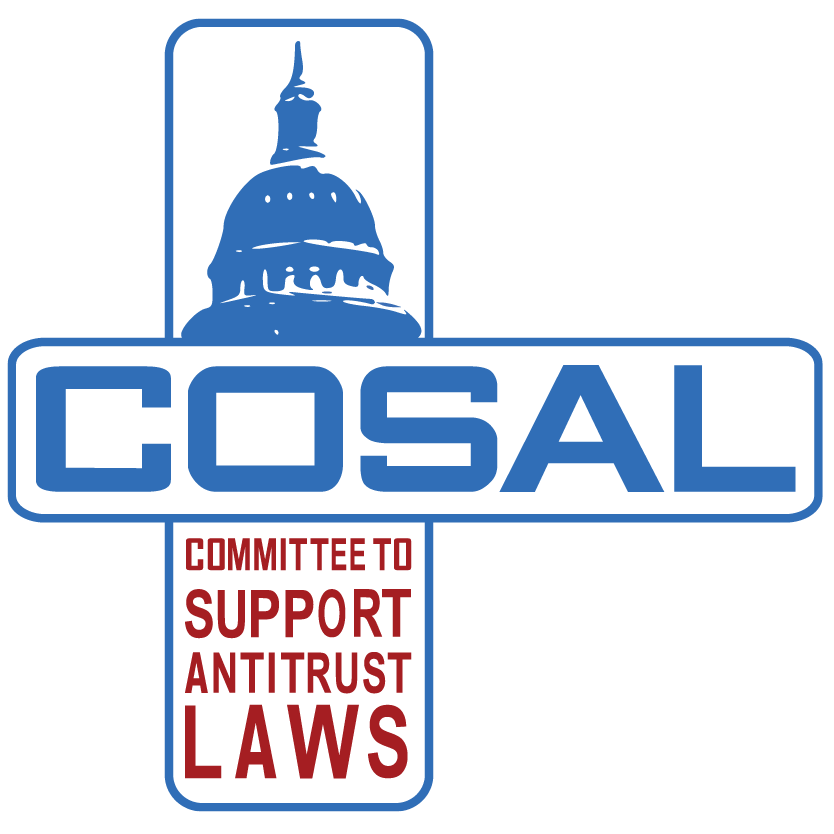Advocacy: ACPERA Permanently Reauthorized by Congress
Legislation to permanently reauthorize the Antitrust Criminal Penalty Enhancement and Reform Act (ACPERA) was signed into law by President Trump on October 1, 2020. This was COSAL’s highest legislative priority. COSAL members have used ACPERA to help recover billions of dollars in damages for consumers and businesses that have been victimized by antitrust violations. By providing incentives for antitrust conspirators to cooperate with private plaintiffs, ACPERA is enormously valuable to the successful prosecution of civil cases against price-fixing and other antitrust crimes.
BACKGROUND
ACPERA* provides single damage liability to members of antitrust cartels that admit to their criminal conduct and provide full cooperation to both the Department of Justice and civil litigants. When Congress enacted ACPERA in 2004, COSAL’s advocacy helped ensure that joint and several liability for full treble damages would be preserved for uncooperating defendants so that cartel victims would continue to be entitled to full relief. COSAL also successfully urged lawmakers to include a five-year sunset provision in the law so this novel approach to antitrust enforcement could be tested out and improved or be allowed to expire if the experiment failed.
When Congress reauthorized ACPERA in 2010** , COSAL led the effort to modify the law so that cooperating defendants are required to provide timely cooperation to antitrust plaintiffs in order to be eligible for single damages and relief from joint and several liability. During the first five years of the law, delays by defendants in providing information to plaintiffs had hindered the effectiveness of a number of antitrust cases. The changes made to the law also prohibit unreasonable delay in providing cooperation once a Department of Justice stay has been lifted. With COSAL’s support, Congress modified and reauthorized ACPERA for another ten years.
To prepare for the reauthorization of ACPERA in 2020, the Department of Justice held an ACPERA roundtable April 11, 2019, hosted by Assistant Attorney General for Antitrust Makan Delrahim. A number of stakeholders spoke, most of whom represent antitrust defendants and business trade associations, such as the US Chamber of Commerce and the Business-Industry Advisory Committee. A representative of the ABA also presented, as well as three COSAL members. The majority of speakers who presented on behalf of the business community recommended that ACPERA be modified in ways that would benefit antitrust defendants at the expense of their victims. Their recommendations included giving complete immunity to cooperating defendants, and expressly limiting “satisfactory cooperation” to only include information provided to the DOJ.
In a written submission to DOJ, COSAL strenuously opposed these and other proposals that would weaken ACPERA, reducing the deterrent effect of private antitrust enforcement and benefitting antitrust defendants, many of whom have pled guilty to federal crimes. COSAL members have broad experience litigating complex antitrust cases in which defendants seek reduced liability under ACPERA’s leniency program. Based on our members’ unique perspective, COSAL argued that, in general, ACPERA is working well to accomplish its dual purposes: (1) incentivizing disclosure of cartel behavior to the DOJ, and (2) incentivizing cooperation with private plaintiffs to enhance the opportunity for victim recovery. We explained that the statute has been very successful in securing timely and appropriate cooperation from ACPERA applicants. We urged Congress not to weaken the incentives for cooperation nor the opportunity for full recovery for antitrust victims. We also argued that the sunset provision should be removed from the law because, after 16 years of litigating cases under ACPERA, we have determined that the experiment has been a success for both public and private antitrust enforcement.
COSAL’s position carried the day. DOJ rejected the calls from the defense bar and business groups to weaken ACPERA and to enact another sunset provision. Democratic and Republican antitrust leaders in the House and Senate introduced legislation to permanently reauthorize ACPERA without a sunset. That legislation has now been signed into law.
* Pub. L. No. 108-237, tit. II, 118 Stat. 61.
** 1n 2009, Congress passed a one-year extension of ACPERA.

